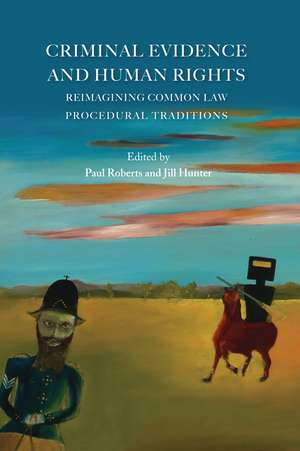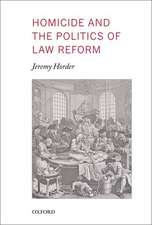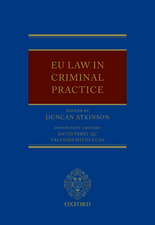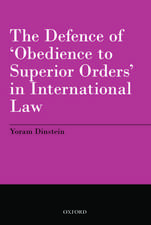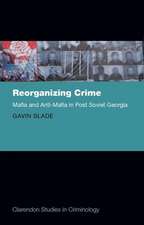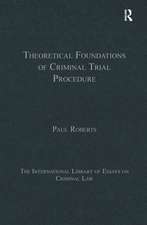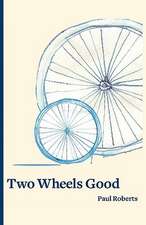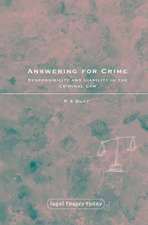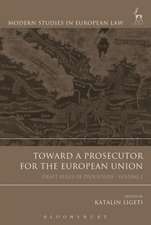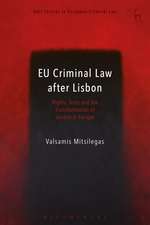Criminal Evidence and Human Rights: Reimagining Common Law Procedural Traditions
Editat de Professor Paul Roberts, Jill Hunteren Limba Engleză Paperback – 11 sep 2013
| Toate formatele și edițiile | Preț | Express |
|---|---|---|
| Paperback (1) | 230.09 lei 6-8 săpt. | |
| Bloomsbury Publishing – 11 sep 2013 | 230.09 lei 6-8 săpt. | |
| Hardback (1) | 574.34 lei 3-5 săpt. | |
| Bloomsbury Publishing – 17 mai 2012 | 574.34 lei 3-5 săpt. |
Preț: 230.09 lei
Preț vechi: 291.68 lei
-21% Nou
Puncte Express: 345
Preț estimativ în valută:
44.03€ • 47.08$ • 36.71£
44.03€ • 47.08$ • 36.71£
Carte tipărită la comandă
Livrare economică 17 aprilie-01 mai
Preluare comenzi: 021 569.72.76
Specificații
ISBN-13: 9781849464956
ISBN-10: 1849464952
Pagini: 450
Dimensiuni: 156 x 234 x 15 mm
Greutate: 0.64 kg
Editura: Bloomsbury Publishing
Colecția Hart Publishing
Locul publicării:London, United Kingdom
ISBN-10: 1849464952
Pagini: 450
Dimensiuni: 156 x 234 x 15 mm
Greutate: 0.64 kg
Editura: Bloomsbury Publishing
Colecția Hart Publishing
Locul publicării:London, United Kingdom
Caracteristici
Comprising sixteen essays plus the editors' thematic introduction, this volume explores various aspects of the 'human rights revolution' in criminal evidence and procedure across the world.The contributors provide expert evaluations of their own domestic law and practice with frequent reference to comparative experiences in other jurisdictions.The book is the latest theoretically informed, methodologically astute and doctrinally rigorous scholarship in criminal procedure and evidence, human rights and comparative law, and will be a major addition to the literature in all of these fields.
Notă biografică
Paul Roberts is Professor of Criminal Jurisprudence, University of Nottingham.Jill Hunter is Professor of Law, University of New South Wales.
Cuprins
Introduction-The Human Rights Revolution in Criminal Evidence and Procedure Paul Roberts and Jill Hunter1. A Constitutional Revolution in South African Criminal Procedure? PJ Schwikkard2. Human Rights in Hong Kong Criminal Trials Simon NM Young3. Right to Counsel During Custodial Interrogation in Canada: Not Keeping Up with the Common Law Joneses Christine Boyle and Emma Cunliffe4. Degrading Searches and Illegally Obtained Evidence in the Malaysian Criminal Justice System Salim Farrar5. Human Rights, Constitutional Law and Exclusionary Safeguards in Ireland John Jackson6. The Exclusion of Evidence Obtained by Violating a Fundamental Right: Pragmatism Before Principle inthe Strasbourg Jurisprudence Andrew Ashworth7. Normative Evolution in Evidentiary Exclusion: Coercion, Deception and the Right to a Fair Trial Paul Roberts8. Ozymandias On Trial: Wrongs and Rights in DNA Cases Jeremy Gans9. Delayed Complaint, Lost Evidence and Fair Trial: Epistemic and Non-epistemic Concerns David Hamer10. 'Give Us What You Have'-Information, Compulsion and the Privilege Against Self-Incrimination as a Human Right Andrew L-T Choo11. The Presumption of Innocence as a Human Right Hock Lai Ho12. Confronting Confrontation Mike Redmayne13. Human Deliberation in Fact-Finding and Human Rights in the Law of Evidence Craig R Callen14. Reliability, Hearsay and the Right to a Fair Trial in New Zealand Chris Gallavin15. Finessing the Fair Trial for Complainants and the Accused: Mansions of Justice or Castles in the Air? Terese Henning and Jill Hunter16. Human Rights, Cosmopolitanism and the Scottish 'Rape Shield' Peter Duff
Recenzii
Criminal Evidence and Human Rights offers Canadian readers valuable exposure to the theory and practice of criminal procedure throughout the common law world, where similar questions about the recognition of human rights in criminal trials are being confronted. The book could, however, just as easily be picked up and appreciated by scholars in other common law or (in recognition of the increasing internationalization of evidence law) civil law jurisdictions, regardless of whether readers are interested in criminal procedure, evidence law, constitutional law or human rights law. Criminal Evidence and Human Rights advances many of the major debates that are currently taking place in these fields and is, therefore, a worthwhile read for anyone who seeks to participate in or to influence these important conversations.
[A] superb [example] of how edited collections should be done. streets ahead of the guesswork that passed as scholarship in the early days of HRA area studies.. [A]lso very well produced. and with a series of chapters on key aspects of the subject by scholars who know their subjects inside out: Andrew Ashworth on the exclusion of evidence; Craig Callen and Paul Roberts each with a chapter on evidence law. To continue its upper trajectory the HRA needs not just the public lawyers but also scholars of the common law and of criminal procedure and evidence to take it seriously. These books prove that the best of them already do.
It would be difficult to identify any major criticisms of Criminal Evidence and Human Rights.. [It] offers readers valuable exposure to both the theory and practice of criminal procedure - in its quest to recognize human rights at criminal trials - throughout the common law world where similar questions are being confronted. However, the book could just as easily be picked up and appreciated by scholars in other common law, or (in recognition of the increasing internationalisation of evidence law) civil law jurisdictions, regardless of whether readers are interested in criminal procedure, evidence law, constitutional law, or human rights law. Criminal Evidence and Human Rights advances many of the major debates that are currently taking place in these fields, and is therefore a worthwhile read for anyone who seeks to participate in or influence these important conversations.
[The book] comprises 16 chapters written by some of the most renowned authorities on criminal procedure and evidence in the common law world [and] the collection, as a whole, makes an important contribution to the existing body of literature.
[A] superb [example] of how edited collections should be done. streets ahead of the guesswork that passed as scholarship in the early days of HRA area studies.. [A]lso very well produced. and with a series of chapters on key aspects of the subject by scholars who know their subjects inside out: Andrew Ashworth on the exclusion of evidence; Craig Callen and Paul Roberts each with a chapter on evidence law. To continue its upper trajectory the HRA needs not just the public lawyers but also scholars of the common law and of criminal procedure and evidence to take it seriously. These books prove that the best of them already do.
It would be difficult to identify any major criticisms of Criminal Evidence and Human Rights.. [It] offers readers valuable exposure to both the theory and practice of criminal procedure - in its quest to recognize human rights at criminal trials - throughout the common law world where similar questions are being confronted. However, the book could just as easily be picked up and appreciated by scholars in other common law, or (in recognition of the increasing internationalisation of evidence law) civil law jurisdictions, regardless of whether readers are interested in criminal procedure, evidence law, constitutional law, or human rights law. Criminal Evidence and Human Rights advances many of the major debates that are currently taking place in these fields, and is therefore a worthwhile read for anyone who seeks to participate in or influence these important conversations.
[The book] comprises 16 chapters written by some of the most renowned authorities on criminal procedure and evidence in the common law world [and] the collection, as a whole, makes an important contribution to the existing body of literature.
Descriere
Criminal procedure in the common law world is being recast in the image of human rights. These essays explore various aspects of the 'human rights revolution' in criminal evidence and procedure in Australia, Canada, England and Wales, Hong Kong, Malaysia, New Zealand, Ireland, Singapore, Scotland, South Africa and the USA.
